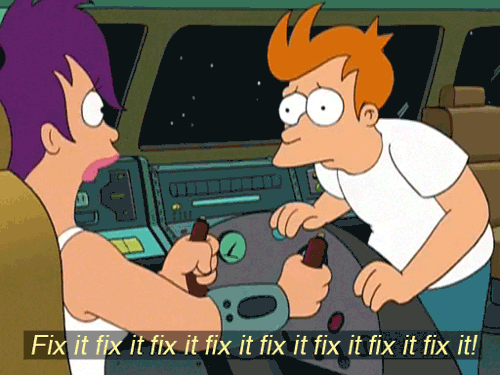
Cookie Monster / Giphy
The only way that you will qualify for work-study in your financial aid package is to fill out your FAFSA each year. Work-study is given to students based on their financial need, and campus jobs go to work-study students before they are opened up to the general student population. Work-study jobs are part-time (typically up to 10 hours each week). They usually place students in on-campus positions.
As a freshman, you’ll hear about your work-study award in your acceptance package. As you progress through college, however, you’ll need to be sure to fill out the FAFSA each year if you want to continue to qualify for work-study. Your eligibility is also dependent on your (or your family’s) income. If your family makes more money one year than the previous, you may no longer be eligible for federal work-study.
Some schools, like University of California, Berkeley, may offer you the opportunity to convert loans into work-study. This is an awesome way to save some money (loans have to be repaid with interest after you graduate) and to enhance your résumé. If your school offers this option, consider taking it. Be sure, though, that you are directing your work-study funds to tuition and school-related fees, otherwise you’ll be liable for them later on.
So what kind of job will you get as a work-study student? In some cases, you’ll have to apply for different jobs that are offered on campus specifically to work-study students. These opportunities can range from working in admissions and giving campus tours to working in the library or serving in the dreaded dining hall. (To be fair to students with dining hall jobs, I know people who actually loved working there. It’s a very social job and doesn’t require you to think terribly hard.)

Futurama / Giphy
Other schools may just assign you a position and you’ll be stuck with what they’ve chosen. Some may split the difference: You could be asked to fill out a short survey showcasing your talents and skills, which your school will use to match you to an appropriate work-study job. My school used the last option, but what I must’ve put on the survey that resulted in me working at the Student Computing Information Center is beyond me. My ability to use Microsoft Word did not help me at all when I was trying to install personal routers and troubleshoot Xboxes.
After work-study jobs get assigned to students who have received federal work-study as part of their financial aid packages, leftover jobs may be opened up to students who didn’t qualify for work-study but who are still interested in working. Again, jobs may be assigned in an application-based, random, or semi-random system. If you have to apply, do so early. There’s often less competition, and you may be able to get a job that interests you. My junior year I applied and interviewed to be a museum attendant for the campus art gallery. Best decision I’ve ever made. It was infinitely more suited to my interests than manning the computer help desk was.
Lots of schools have job boards for on-campus positions. Keep an eye on the options, and network with professors and sports coaches too. Certain departments may have it within their budgets to hire student aides, lab assistants, or research assistants (those who work with certain professors). These are the types of jobs that are going to be academically engaging while also putting some cash into your pocket. You can switch jobs each year, and you may also be allowed to change between semesters or trimesters. Your financial aid office will have all the answers.
Once you have a job, you’ll be able to start earning money (at least federal minimum wage, but often more), which can be directed toward tuition and fees or deposited into your bank account for personal use.

Full House / Giphy
What will you do with the extra $300 or so that you’re making each month? Consider putting it toward the cost of tuition or repaying any money that you owe to your school. If you choose one of these options, you could elect for your paycheck from work-study to be directly deposited into accounts payable. You’d never see a paycheck land in your account, but you would watch your bill drop slowly each month. This simplifies the number of money transfers that are occurring and ensures that your tuition bill gets paid.
If you’ve worked out a deal with your family that allows you to pocket the money and not apply it directly to tuition, that’s awesome! Managing your money wisely, however, is a whole other ball game. Follow the steps listed below to stay on top of your checking account and not make any money mistakes!
- Open a checking account if you don’t have one already. Ideally, pick a bank that has branch locations in both your hometown and the city where you’ll be attending college. This way you can use bank-specific ATMs and not be penalized each time you need to take out cash. You can also talk with a banker in person if there are any problems with your account.
- Create a budget. Once you know how many hours you’ll be working each week and what your salary is, you have a good idea of your income. Now you need to calculate how much money you’ll be spending each week or month. Be sure to consider extra expenses like plane tickets home or nights out with friends, but be aware that small expenses can add up just as fast as the big ones. The best budget would have income greater than expenses, because that means you can build up some savings, but it’s okay if your income is equal to your expenses. You just don’t want to have your expenses greater than what you’re earning.
- Decide if you really need a credit card. Credit cards can be wonderful, but they also tend to lead people down a rabbit hole. If you can pay off your balance in full each month, there is no reason why you shouldn’t get a credit card and start building credit. If you have to carry a balance or can’t pay each month, you may want to think twice. Credit card debt leads to a lower credit score, which can affect your future in many negative ways (trouble renting an apartment, trouble buying a car, and debt collectors, to name a few).
- Pay for essentials before nonessentials. You don’t want to find yourself at the end of the month needing money for rent or food and unable to pay for it because you spent all of your money at the movie theater or shopping mall. Budget money for your essentials (think: things you need to live) before you start spending money on things that you want.

Bridesmaids / Giphy
Don’t forget that as a college student, you are eligible for all sorts of discounts! Go ahead and whip out your student ID card at the movie theater, museums, and attractions. Every bit of savings helps, and you’ll only get to use your ID for a few years. Take advantage of the perks you’re given and save more of your hard-earned money for essentials.
-
Scholarships for LGBT+ Students
-
Scholarship Opportunities for Undocumented Students
-
Tips to Save on Unexpected College Costs
-
Scholarships for Students from Kentucky
-
Scholarships for Students from Georgia
-
Scholarships for Students from North Carolina
-
Scholarships for Students from Virginia
-
A Fashion-Forward Scholarship Opportunity from Trendhim
-
Your Financial Aid Package Isn’t Enough. Now What?
-
12 Weird Scholarships You Just Might Qualify for in 2019
-
Simple Ways to Build Your Savings Account
-
Study Finds That Children Get More Expensive as They Get Older

